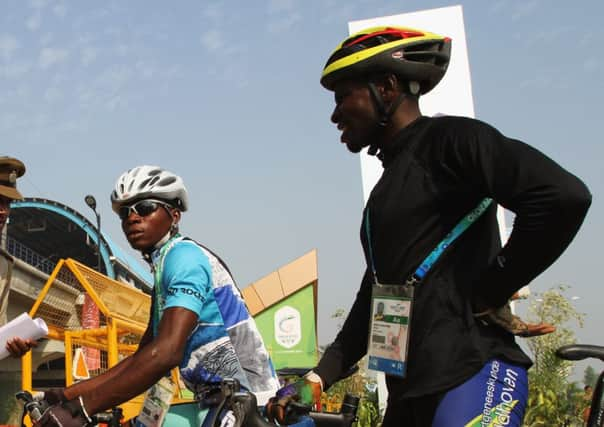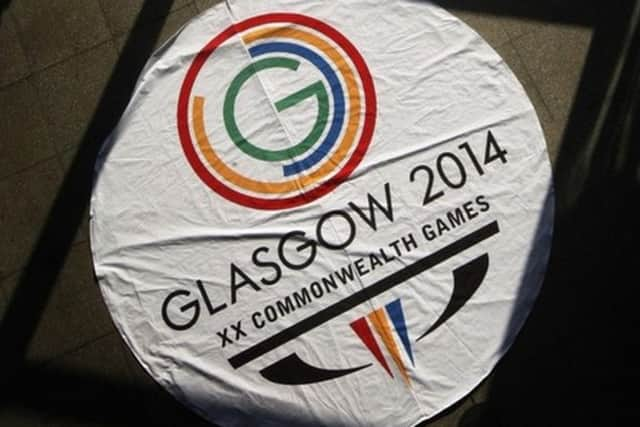Sierra Leone athletes consider staying after Games


Athletes said they are “scared about going back” and wanted to “stay here until it ends”.
Many are thought to have a three-month visa to stay in the UK, potentially meaning they would only require accommodation and living costs to do so.
Advertisement
Hide AdAdvertisement
Hide AdLast night, the Scottish Government said Glasgow and Scotland “are being as hospitable and welcoming as possible to all athletes” but with no international Ebola travel ban in place, there is nothing directly stopping the athletes returning.


It also emerged yesterday that a second member of the team, table tennis
competitor Samuel Morris, had been tested and found to be negative for the potentially fatal disease.
The first, cyclist Moses Sesay, 32, was given the all-clear after being admitted to a Glasgow hospital last week when he reported feeling unwell.
Doctors tested him for various conditions, including Ebola – which is blamed for 729 deaths in an outbreak in four west African countries.
Sesay, whose homeland has declared a public health emergency, was found to be negative for Ebola and released from hospital in time to compete in the men’s individual
cycling time trial at the Games on Thursday.
He has said that he intends to stay in the UK for as long as
legally possible.
“All of us are scared about going back,” he said.
“We have a three-month visa in our passports and if I have the opportunity, I will stay here until it ends.
Advertisement
Hide AdAdvertisement
Hide Ad“It is scary over there. My mother is a medical nurse so she may have to treat people. My wife is also doing work in the medical field.”
A Glasgow 2014 spokesman yesterday denied any suggestion the athletes’ village could be at risk of infection.
He said: “There is no Ebola in the athletes’ village of the Glasgow 2014 Commonwealth Games.”
In other developments at the athletes’ village, a member of the Sierra Leone team, mountain biking champion Mohamed Tholley, appeared to have gone missing.
He was due to compete in the time trial event in Glasgow on Thursday but failed to turn up and was unaccounted for yesterday.
Jackie Brock-Doyle, a spokeswoman for Glasgow 2014, said at a press briefing that organisers were unaware of any missing athletes.
She said: “We have not had a single report of any athlete that has gone missing.
“If someone didn’t turn up and they had gone missing, they would have reported it to us.”
Advertisement
Hide AdAdvertisement
Hide AdThere were reports yesterday that the team’s head, Unisa Deen Kargbo, feared the cyclist may have fled to avoid returning to the worsening situation back home.
He said: “Unfortunately one of our athletes has not turned up for his event and we do not know where he is. It is possible he is not coming back.
“The situation is very serious at home, and it is possible this is why he does not want to return. It is very bad there.”
Despite many athletes intending to stay, he said most wanted to fly back to Sierra Leone.
He added: “We are all very concerned about what is going on, but the rest of us are determined to go home. The only problem is that it is becoming difficult to find flights [due to the outbreak].”
Police said last night that to date they had not received a missing person report relating to the athlete.
Dr Colin Ramsay, from Health Protection Scotland (HPS), said: “There’s been no programme of actively screening athletes simply because of the Commonwealth Games.
“The situation is that if someone presents with symptoms suggestive of the possibility of Ebola virus infection and who has come from a country affected by the current outbreak – and that’s Sierra Leone and Guinea and Liberia – they would be investigated accordingly, and that would involve managing them with a set of standard precautions.”
Advertisement
Hide AdAdvertisement
Hide AdIt was unclear yesterday how many other people in Glasgow or across Scotland may have been tested for Ebola since the west Africa outbreak began earlier this year, as officials said collecting data on negative tests was “meaningless”. It raises the
possibility that further testing has taken place but as the results showed no signs of Ebola, the numbers will not be
released.
An HPS spokesman said: “The symptoms of Ebola are so general such as fever, aches and pains and/or sickness that reporting the testing for Ebola or any other virus which includes these symptoms would be meaningless.”
A Scottish Government spokesman said: “There are no cases of Ebola in Scotland.
“Ebola currently poses a very low risk to Scotland, and we have been working closely with Health Protection Scotland to monitor this situation since the outbreak in west Africa began.”
A spokeswoman for the Games said officials had held several meetings with
Sierra Leone team chiefs yesterday and that they had not raised the issue of staying on.
She said: “If the issue of staying on was raised, we would put them in touch with organisations in the UK who could assist them.”
Advertisement
Hide AdAdvertisement
Hide AdThe spokeswoman also told how the Games’ athletes’ village will be handed back to Glasgow City Council on Thursday, the day after the final athletes are due to leave the city.
Yesterday, the head of the World Health Organisation (WHO), Margaret Chan, said the Ebola outbreak in west Africa is spreading faster than efforts to control it.
She told a summit of regional leaders that failure to contain Ebola could be “catastrophic” in terms of lives lost.
However, she said the virus could be stopped if managed.
Dr Chan was meeting the leaders of the worst-affected countries – Guinea, Liberia and Sierra Leone – to launch a £59m response plan.
That will include funding the deployment of hundreds more healthcare workers to affected countries.
.